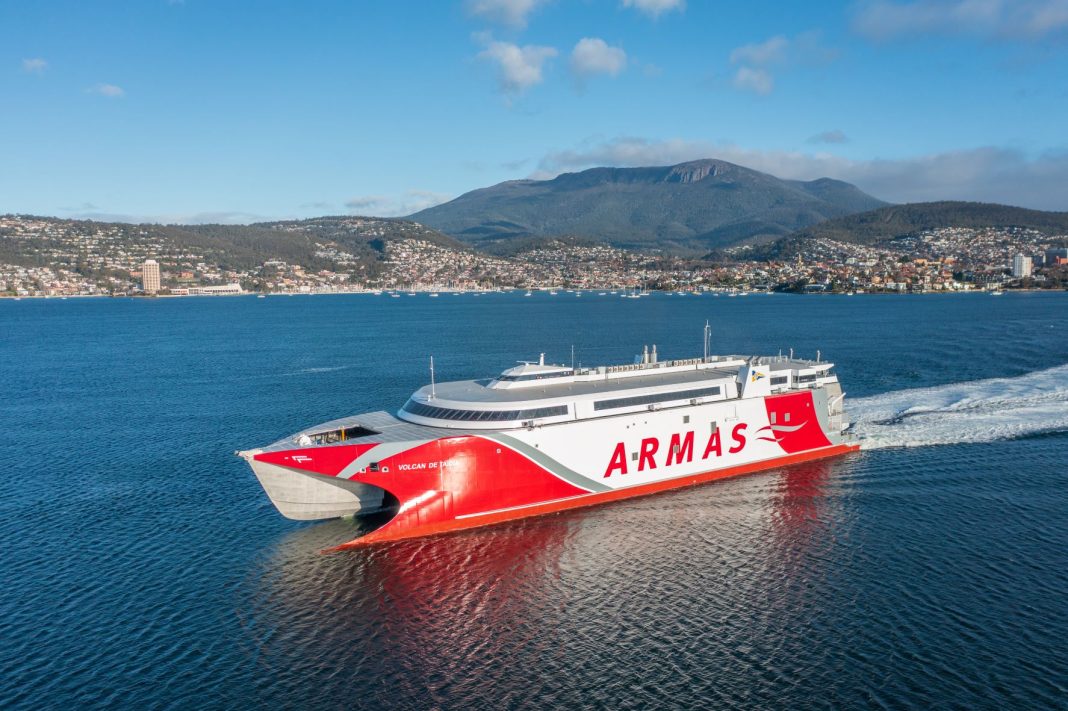Australian shipbuilder Incat Tasmania delivered its latest high-speed ferry, Volcán de Taidía, on 30 Seotember 2011. The 111m catamaran will operate in Spanish waters alongside sister vessel Volcán de Tagoro, which was delivered by Incat in 2019.
Volcán de Taidía set off to Spain via Auckland, across the Pacific Ocean to Tahiti and the Panama Canal, before crossing the Atlantic to her new home in the Canary Islands. Naviera Armas will operate the vessel between Las Palmas de Gran Canaria and Santa Cruz de Tenerife.
The company has an extensive fleet of vessels, and when she enters service Volcán de Taidía will be the sixth Incat-built vessel operating in the fleet.
She is also the second Naviera Armas newbuild direct from Incat Tasmania, having obtained other Incat-built vessels on the second-hand market, explains Naviera Armas owner Antonio Armas senior.
“We are delighted to have a new sister ship of the catamaran Volcán de Tagoro whose excellent performance and benefits have raised the quality of maritime transport to its highest level.
“This is why, upon the introduction of the new Volcán de Taidía, Naviera Armas will reinforce the ‘sea bridge’ between both Canary Islands capitals with two latest generation high speed craft.
“This is very fitting because the delivery of our new ship coincides with the 80th anniversary of the start of the shipping career of Antonio Armas Curbelo, the Lanzarote-based shipowner, creator of the company known today as Naviera Armas,” Antonio Armas said.
Incat Tasmania CEO Tim Burnell says the delivery of a second large high speed ferry to Naviera Armas is a sound endorsement of the excellent seakeeping qualities delivered by Incat catamarans.
“The original vision of Naviera Armas was to facilitate high speed movement for passengers, cars and trucks between the two main cities in the Canary Islands, Las Palmas and Tenerife.
“The one concern Antonio Armas senior had was that this is one of the most exposed routes in the Canary Islands. Volcán de Tagoro has proven it can operate a highly reliable year-round crossing on the route and the delivery of Volcán de Taidia is a resounding vote of confidence in the hull design refinements implemented in 2019,” Tim Burnell said.
Volcán de Taidía has capacity for 1,200 persons, including crew, and the vehicle deck allows for almost 600 TLM (595 truck lane metres) plus 219 cars, or in car-only mode it can accommodate 401 cars. Passenger spaces are divided into three classes, First Class, Business Class and Economy, each area offering bars and food service areas.
The ship is powered by four MAN 20V diesel engines driving Wartsila waterjets. Volcán de Taidía achieved over 42 knots with 600 tonnes deadweight during speed trials.
Both vessels will operate out of the new private port facility strategically located in the centre of the Canary Islands at Las Palmas and developed by Naviera Armas in 2019. Nelson Mandela Pier is the first privately financed passenger terminal in a Spanish state-owned port. The new ships and terminal demonstrate the Naviera Armas’s commitment to its passengers and freight customers.



